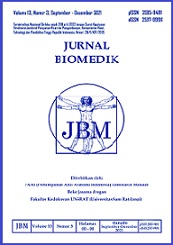PENATALAKSANAAN ULKUS KAKI DIABETES SECARA TERPADU
DOI:
https://doi.org/10.35790/jbm.3.2.2011.864Abstract
Abstract: A diabetic foot ulcer is a common and fearful chronic complication of diabetes mellitus often resulting in amputation, and even death. A diabetic foot ulcer can be prevented by early screening and education in high risk individuals, and the management of underlying conditions such as neuropathy, peripheral arterial disease, and deformity. The prevalence of diabetic foot ulcer patients is 4-10% of the general population, with a higher prevalence in elderly people. Around 14-24 % of diabetic foot ulcer patients need amputations with a recurrence rate of 50% after three years. The main pathogenesis of diabetic foot ulcer is neuropathy and peripheral arterial disease (PAD). PAD contributes to diabetic foot ulcers in 50% of cases; however, it rarely stands alone. Other factors such as smoking, hypertension, and hyperlipidemia may contribute, too. In addition, PAD reduces the access of oxygen and antibiotics to the ulcers. Management of diabetic foot ulcers includes treatment of ischemia by promoting tissue perfusion, debridement for removing necrotic tissues, wound treatment for creating moist wound healing, off-loading the affected foot, surgery intervention, management of the co-morbidities and infections, and prevention of wound recurrences. Other adjuvant modalities include hyperbaric oxygen treatment, GCSF, growth factors, and bioengineered tissues.
Key words: diabetic ulcer, debridement, off loading.
Â
Â
Abstrak: Ulkus kaki diabetes (UKD) merupakan salah satu komplikasi kronik diabetes melitus yang sering dijumpai dan ditakuti oleh karena pengelolaannya sering mengecewakan dan berakhir dengan amputasi, bahkan kematian. UKD dapat dicegah dengan melakukan skrining dini serta edukasi pada kelompok berisiko tinggi, dan penanganan penyebab dasar seperti neuropati, penyakit artei perifer dan deformitas. Prevalensi pasien UKD berkisar 4-10% dari populasi umumnya, dengan prevalensi yang lebih tinggi pada manula. Sekitar 14-24% pasien UKD memerlukan amputasi dengan rekurensi 50 % setelah tiga tahun. Patogenesis utama UKD yaitu neuropati dan penyakit arteri perifer (PAP). PAP berkontribusi 50% pada pasien UKD, tetapi hal ini jarang dijumpai tunggal. Terdapat faktor-faktor lain yang turut berperan seperti merokok, hipertensi dan hiperlipidemia. Selain itu PAP menurunkan akses oksigen dan antibiotik ke dalam ulkus. Penatalaksanaan UKD meliputi penanganan iskemia dengan meningkatkan perfusi jaringan, debridemen untuk mengeluarkan jaringan nekrotik, perawatan luka untuk menghasilkan moist wound healing, off-loading kaki yang terkena, intervensi bedah, pananganan komorbiditas dan infeksi, serta pencegahan rekurensi luka. Terapi ajuvan meliputi terapi oksigen hiperbarik, pemberian granulocyte colony stimulating factors (GCSF), growth factors dan bioengineerd tissues.
Kata kunci: ulkus diabetes, debridemen, off loading.
Downloads
Issue
Section
License
Penyunting menerima sumbangan tulisan yang BELUM PERNAH diterbitkan dalam media lain. Naskah yang masuk dievaluasi dan disunting keseragaman format istilah dan cara penulisan sesuai dengan format penulisan yang terlampir dalam jurnal ini.
Segala isi dan permasalahan mengenai tulisan yang yang diterbitkan dalam jurnal menjadi tanggung jawab penuh dari penulis.







